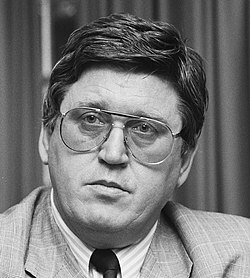Bram Peper
Bram Peper | |
|---|---|
 Bram Peper in 1989 | |
| Minister of the Interior and Kingdom Relations | |
| In office 3 August 1998 – 13 March 2000 | |
| Prime Minister | Wim Kok |
| Preceded by | Hans Dijkstal as Minister of the Interior Joris Voorhoeve as Minister for Netherlands Antilles and Aruba Affairs |
| Succeeded by | Roger van Boxtel (Ad interim) |
| Mayor of Rotterdam | |
| In office 16 March 1982 – 3 August 1998 | |
| Preceded by | (Ad interim) |
| Succeeded by | (Ad interim) |
| Personal details | |
| Born | Abraham Peper 13 February 1940 Haarlem, Netherlands |
| Political party | Labour Party (from 1966) |
| Spouse(s) | First wife
(m. 1968; div. 1974)Second wife
(m. 1977; div. 1990) |
| Children | 4 children |
| Residence | Rotterdam, Netherlands |
| Alma mater | University of Amsterdam (Bachelor of Social Science, Master of Social Science) University of Oslo (Bachelor of Economics, Master of Economics) Erasmus University Rotterdam (Doctor of Philosophy) |
| Occupation | Politician · Sociologist · Researcher · Academic administrator · Nonprofit director · Professor |
Abraham "Bram" Peper (born 13 February 1940) is a Dutch retired politician of the Labour Party (PvdA).
Biography[]
Early life[]
After finishing the HBS, Peper studied social sciences at the University of Amsterdam until 1965 and economy and sociology at the University of Oslo (1963/1964) and got his PhD at the Nederlandse Economische Hogeschool (Currently Erasmus University Rotterdam) in 1972. Peper became researcher, and fulfilled several academic functions, including professor at the Erasmus University until he became Mayor of Rotterdam in 1982 at the age of 42. Rotterdam is the second largest city of the Netherlands, and Peper was one of the youngest mayors of a large city at the time.
Politics[]
In 1984 an interview with Peper and his wife with Ischa Meijer was published in Vrij Nederland, a Dutch magazine, in which Peper was critical of citizens and rulers. The interview was perceived as arrogant, and seemed to be made while Peper was in a drunk condition. Peper made his apologies, and soon after he and his wife divorced.
While Peper was mayor, the city completed its process of rebuilding after World War II, which resulted in a new skyline for Rotterdam. In the second half of his mayorship, Peper had a tough time with for instance his defeat on the formation of a city province (90% of the voters in a referendum were against). Peper was mayor until 1998, when he joined the government as Minister of the Interior of the Netherlands in the second Kok cabinet.
Starting in 1999, rumours were spreading that Peper had made incorrect declarations while he was mayor of Rotterdam. On 13 March 2000 Peper resigned as minister, according to himself to no longer bring problems to the public government, and to be better able to defend himself.[1] Although a report on 17 March suggested that Peper did not act properly regarding the declarations, Peper won the legal procedures finally two years later.
From 2002 until 2004 Peper was professor at the Nyenrode Business University, a private university, from which he resigned due to a disagreement regarding a study trip to the European Union in Brussels.
Decorations[]
| Honours | ||||
| Ribbon bar | Honour | Country | Date | Comment |
|---|---|---|---|---|
| Officer of the Order of Orange-Nassau | Netherlands | 30 April 2003 | ||
References[]
- ^ Interview in Vrij Nederland, 12 July 2003 (Dutch)
External links[]
 Media related to Bram Peper at Wikimedia Commons
Media related to Bram Peper at Wikimedia Commons
- Official
- (in Dutch) Dr. A. (Bram) Peper Parlement & Politiek
- 1940 births
- Living people
- Dutch sociologists
- Dutch nonprofit directors
- Dutch expatriates in Norway
- Erasmus University Rotterdam alumni
- Erasmus University Rotterdam faculty
- Labour Party (Netherlands) politicians
- Mayors of Rotterdam
- Ministers of the Interior of the Netherlands
- Ministers of Kingdom Relations of the Netherlands
- Nyenrode Business University faculty
- Officers of the Order of Orange-Nassau
- People from Haarlem
- University of Amsterdam alumni
- 20th-century Dutch educators
- 20th-century Dutch politicians
- 21st-century Dutch politicians

